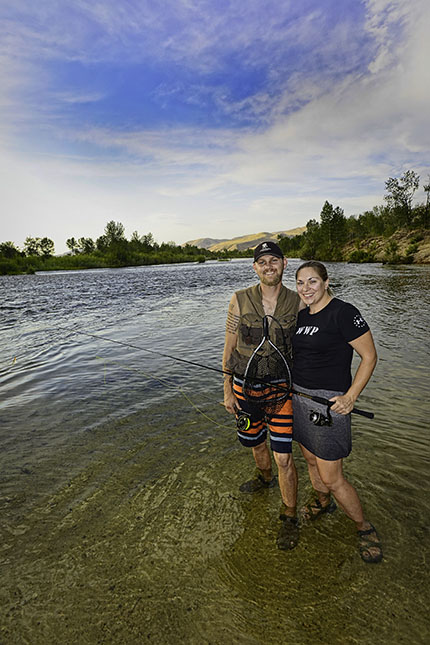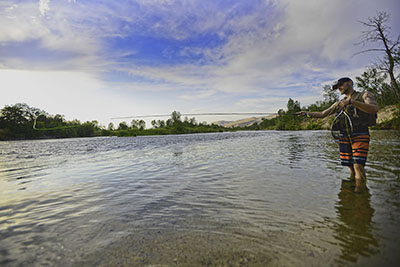Veteran Finds Purpose After Loss of Fellow Marines to Suicide

Adam Harris joined the Marines shortly after high school. He was deployed to Iraq three times. Around 2003, he saw combat that would affect him and his fellow Marines for years to come, including getting ambushed daily and witnessing the sniper shooting of a close team leader.
Seven Marines from his platoon did not make it home from combat and more than 30 from the larger Marine company would die by suicide after they returned home.
“I was 20 at that point, and there were guys who were younger,” Adam said. “It’s hard to think about it sometimes, knowing what we all went through in Iraq, and coming [back home] to a dangerous battleground in your head.”
On a tough day when Adam was home alone and was having suicidal thoughts, a veteran friend dropped by to check on him. That knock on the door saved his life.
It would be years before Adam could talk about how he felt that day. In fact, understanding that post-traumatic stress disorder could “get the best of you” after getting home took some time. But Adam persevered in seeking opportunities to meet other veterans and accompanied his friend to Wounded Warrior Project® (WWP) connection events.
At one of those events, Adam met a WWP staff member who had been in Iraq.
“It turned out that he was in Ramadi at the same time I was, so we bonded pretty quickly,” Adam said.
After that, reaching out for help became easier, and Adam signed up for a WWP program called Project Odyssey®. The 12-week mental health program focuses on reaching individual warriors’ goals and starts with a week of adventure-based learning. Adam embraced the adventure aspects – they were second nature to an Idaho native who loves hiking in the mountains and doing anything outdoors.
Flipping the Tarp of Life
Adam did not expect that the physical aspects of some of the exercises during Project Odyssey would have such profound psychological effects on him.
One of the activities involved a group of veterans standing on a tarp and figuring out together how to flip the tarp without stepping off.
Although he doesn’t remember the exact words used by the Project Odyssey group leader, the impact was powerful. “He gave the analogy of us flipping the tarp and doing the same thing in our lives, with the knowledge that [service-connected PTSD] was a part of our chapter and it’s still there, but how to go about it in a different way,” Adam said.
“I remember it just hit me so hard. I remember stepping out and just crying for a good 20 minutes. It was a little bit embarrassing, but it was such a pivotal point for me.”
Something about the physical weight and pressure on the tarp reminded Adam of his own struggles to turn his life around. By doing the exercise with other warriors, he internalized that “as challenging as it may seem, anything can be done, so step up and move forward.”
Adam and his fellow Marines are not alone in experiencing the link between PTSD and veteran suicide. Recent research has shown that more post-9/11 veterans have died from suicide than in combat. According to WWP’s 2021 Annual Warrior Survey, nearly 1 in 4 warriors served by WWP had suicidal thoughts in the past 12 months, with 70% having them in the previous two weeks. The report also shows 16% of WWP warriors have attempted suicide at least once in their lifetimes, and the average number of suicide attempts doubled after military service.
Tackling Veteran Suicide through Empowerment
According to Veterans Affairs, 17 servicemen and women die by suicide every day.

WWP approaches PTSD and veteran suicide from several angles and has programs that address suicide prevention and mental health resilience. Project Odyssey is only one of several WWP programs to tackle veteran suicide.
For veterans like Adam, the journey to healing can be a bumpy road. WWP staff work to help smooth the path for veterans, while empowering them to help other warriors along the way.
Adam continued to move forward in his healing and found ways to give back. In the next few years after that first Project Odyssey, he joined other veterans in many other activities through WWP. He got involved in peer support groups and organized fundraisers to help other veterans.
“I hosted and ran the Red, White and Blue Golf Tournaments in Boise,” Adam said. “That was a personal thing I wanted to start, for what Wounded Warrior Project has done for me – I wanted to help give back.”
Adam found comfort in sharing his struggles and getting to know veterans from different backgrounds who were also affected by war.
Adam said that he got to see how life can go on and still be happy, even with all the struggles.
These days, Adam enjoys spending time with his wife and children. He still enjoys the outdoors and has taken up a new farming enterprise. He’s proud of his service and appreciates his bond with service members of all military branches.
“As I’ve progressed in my own healing, I’ve been able to use my experiences as fuel to continue the drive and the motivation to be positive and be more open with my story,” Adam said.
“When you’re inundated with other things in life, you say, ‘things are good, I’m moving forward,’ and then it creeps back up on you,” Adam observed. “There are definitely some hard days to deal with but knowing coping mechanisms and where to reach out for help when you need it definitely makes it better.”
If you or someone you know is struggling with thoughts of suicide, contact the Veterans Crisis Line by dialing 988 (press 1), or texting 838255
Learn more about how WWP helps warriors and caregivers through mental health programs and PTSD treatment options at www.woundedwarriorproject.org/CombatStigma.
Contact: Raquel Rivas – Public Relations, rrivas@woundedwarriorproject.org, 904.426.9783
About Wounded Warrior Project
Since 2003, Wounded Warrior Project® (WWP) has been meeting the growing needs of warriors, their families, and caregivers — helping them achieve their highest ambition. www.woundedwarriorproject.org